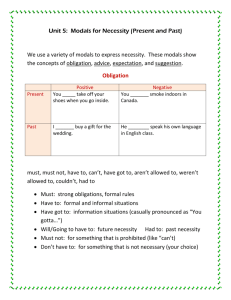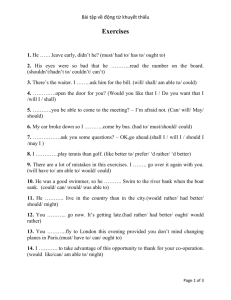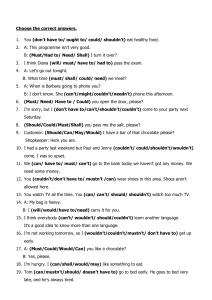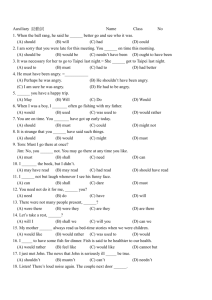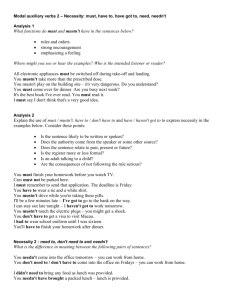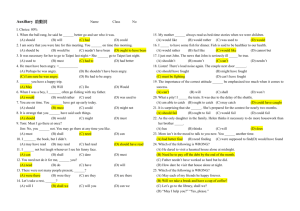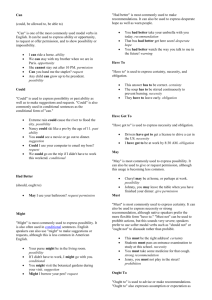tabla-de-modales-usos-y
advertisement
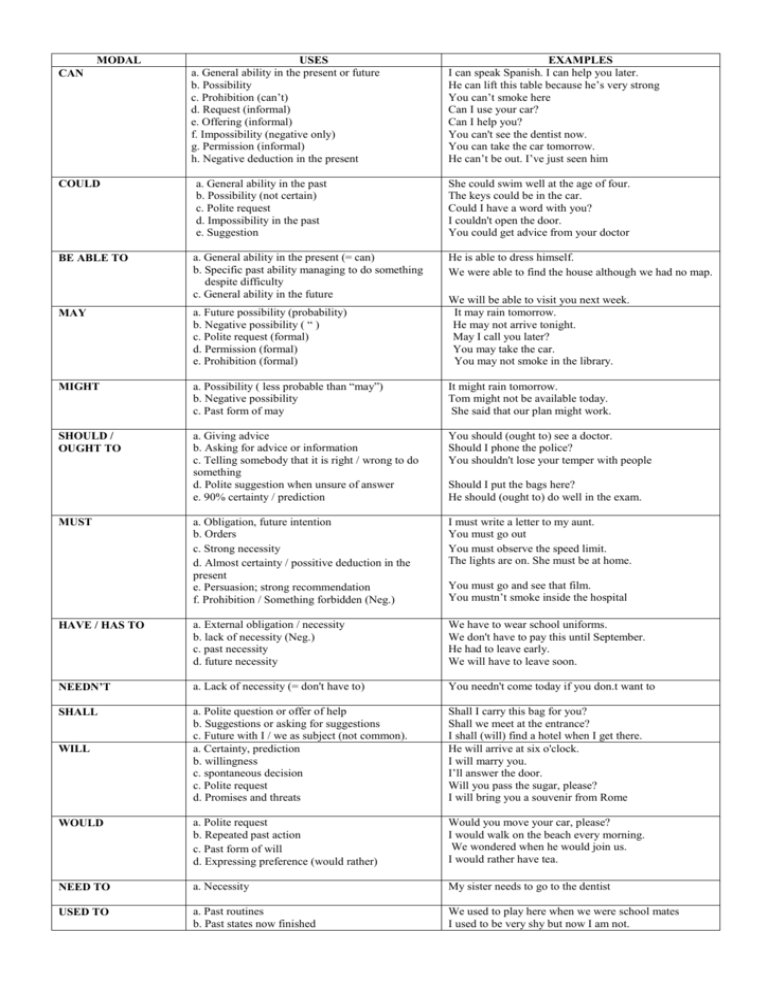
MODAL CAN USES a. General ability in the present or future b. Possibility c. Prohibition (can’t) d. Request (informal) e. Offering (informal) f. Impossibility (negative only) g. Permission (informal) h. Negative deduction in the present EXAMPLES I can speak Spanish. I can help you later. He can lift this table because he’s very strong You can’t smoke here Can I use your car? Can I help you? You can't see the dentist now. You can take the car tomorrow. He can’t be out. I’ve just seen him COULD a. General ability in the past b. Possibility (not certain) c. Polite request d. Impossibility in the past e. Suggestion She could swim well at the age of four. The keys could be in the car. Could I have a word with you? I couldn't open the door. You could get advice from your doctor BE ABLE TO a. General ability in the present (= can) b. Specific past ability managing to do something despite difficulty c. General ability in the future He is able to dress himself. We were able to find the house although we had no map. MAY a. Future possibility (probability) b. Negative possibility ( “ ) c. Polite request (formal) d. Permission (formal) e. Prohibition (formal) We will be able to visit you next week. It may rain tomorrow. He may not arrive tonight. May I call you later? You may take the car. You may not smoke in the library. MIGHT a. Possibility ( less probable than “may”) b. Negative possibility c. Past form of may It might rain tomorrow. Tom might not be available today. She said that our plan might work. SHOULD / OUGHT TO a. Giving advice b. Asking for advice or information c. Telling somebody that it is right / wrong to do something d. Polite suggestion when unsure of answer e. 90% certainty / prediction You should (ought to) see a doctor. Should I phone the police? You shouldn't lose your temper with people a. Obligation, future intention b. Orders c. Strong necessity d. Almost certainty / possitive deduction in the present e. Persuasion; strong recommendation f. Prohibition / Something forbidden (Neg.) I must write a letter to my aunt. You must go out You must observe the speed limit. The lights are on. She must be at home. HAVE / HAS TO a. External obligation / necessity b. lack of necessity (Neg.) c. past necessity d. future necessity We have to wear school uniforms. We don't have to pay this until September. He had to leave early. We will have to leave soon. NEEDN’T a. Lack of necessity (= don't have to) You needn't come today if you don.t want to SHALL a. Polite question or offer of help b. Suggestions or asking for suggestions c. Future with I / we as subject (not common). a. Certainty, prediction b. willingness c. spontaneous decision c. Polite request d. Promises and threats Shall I carry this bag for you? Shall we meet at the entrance? I shall (will) find a hotel when I get there. He will arrive at six o'clock. I will marry you. I’ll answer the door. Will you pass the sugar, please? I will bring you a souvenir from Rome WOULD a. Polite request b. Repeated past action c. Past form of will d. Expressing preference (would rather) Would you move your car, please? I would walk on the beach every morning. We wondered when he would join us. I would rather have tea. NEED TO a. Necessity My sister needs to go to the dentist USED TO a. Past routines b. Past states now finished We used to play here when we were school mates I used to be very shy but now I am not. MUST WILL Should I put the bags here? He should (ought to) do well in the exam. You must go and see that film. You mustn’t smoke inside the hospital MODAL PERFECT MUST HAVE + Past Participle (P.P.) USE When we are certain about past actions or draw logical conclusions EXAMPLE Paul didn't answer my calls. He must have been out all day. MUSTN’T HAVE + P.P. CAN’T HAVE + P.P. When we are certain something did not happen He must not have heard about the earthquake. (= can't have heard) MAY/MIGHT/COULD HAVE + P.P. When we are not sure because we do not actually know what happened in the past Paul is late for work. He may have missed the bus. He might have left his house late. COULD HAVE + P.P. when we had the ability to do something in the past but we didn't do it I could have gone to the party but didn't want to. COULDN’T HAVE + P.P. To express that something didn’t happen the way it seemed When expectations were not fulfilled He couldn’t have done anything wrong SHOULD HAVE + P.P. When sensible advice wasn't followed He should have arrived by now, but he still isn't here. You should have checked the brakes on your car before starting out. SHOULDN’T HAVE + P.P. To refer to a foolish past action You shouldn't have taken the car without asking. WOULD HAVE + P.P. When we were willing to do something, but didn't do it I would have helped you, but I was away for the weekend. WILL HAVE + P.P. (Future Perfect) When we talk about an action that will be completed by some point in the future By this time next year I will have passed all my exams. NEEDN’T HAVE + P.P. To express the absence of necessity in the past You needn’t have bought anything to the party Functions represented by Modals and Semimodals: Ability: CAN, COULD, BE ABLE TO Possibility: CAN, COULD Probability: CAN, COULD, MAY, MIGHT Certainty: WILL, WON’T Permission: CAN, COULD, MAY, MIGHT, CAN’T Offers: CAN, COULD, MAY, WILL, WON’T, WOULD, WOULDN’T, SHALL Requests: CAN, COULD, MAY, MIGHT, WILL, WOULD, WON’T, WOULDN’T Suggestions: SHALL, CAN, COULD, MIGHT, WILL, WOULD, WON’T, WOULDN’T Invitations: WILL, WOULD, WON’T, WOULDN’T Deduction: MUST, CAN’T, COULDN’T, MAY, MIGHT, COULD, WILL, WON’T Lack of Obligation: NEEDN’T, DON’T NEED TO, DON’T HAVE TO, HAVEN’T GOT TO Necessity: MUST, HAVE TO, SHOULD, OUGHT TO Advisability: SHOULD, OUGHT TO, NEED TO Obligation: MUST, HAVE TO, HAVE GOT TO Inadvisability. SHOULDN’T. OUGHT NOT TO Prohibition. MUSTN’T, CAN’T Promise: SHALL, WILL Habit: WILL, WOULD, USED TO Preference: WOULD RATHER/SOONER Order: SHALL, MUST Threat: SHALL Willingness: WILL Outrage: DARE Courage or lack of courage: DARE, DAREN’T Criticism: COULD, SHOULD, OUGHT TO Duty: MUST, OUGHT TO, HAD TO

